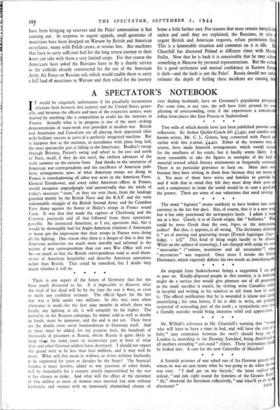A SPECTATOR 'S NOTEBOOK
IT would be singularly unfortunate if the peculiarly harmonious relations both between this country and the United States gener- ally, and between the officers and-men of the respective armies, were marred by anything like a competition in credit for the victories in France. Actually what is in progress is one of the most striking demonstrations of team-work ever provided in modern war. British and Americans and Canadians are all playing their appointed roles with brilliant success as parts of a perfectly integrated machine. But it happens that at the moment, in accordance with plans long laid, the most spectacular part is falling to the Americans. Bradley's sweep through Brittany, Patton's swing and wheel to the east and north of Paris, recall, if they do not excel, the swiftest advances of the early summer on the eastern front. And thanks to the enterprise of American war correspondents and the excellence of American pub- licity arrangements news of what American troops are doing in France is overshadowing all other war news in the American Press. General Eisenhower, and every other American officer in France, would recognise ungrudgingly and unreservedly that the whole of today's successes " stem," as they say over there, from the landings guarded mainly by the British Navy and the R.A.F. and the stern indomitable struggle of the British Second Army and the Canadian First Army against the flower of Hitler's troops in France round Caen. It was that that made the capture of Cherbourg and the Cotentin peninsula and all that followed from those operations possible. No instructed American, as I say, questions that, but it ould be thoroughly bad foi Anglo-American relations if Americans at home got the impression that their troops in France were doing all the fighting. One reason why there is a danger of that is that the American authorities are much more sensible and informal in the matter of war correspondents than our own War Office will ever be—so much so that the British correspondents tend to avail them- stives of American hospitality and describe American operations rather than British. That could be remedied, but I doubt Very much whether it will be.


























 Previous page
Previous page